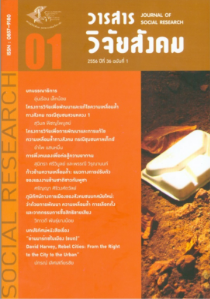ภูมิทัศน์ทางการเมืองของสังคมชนบทสมัยใหม่: ว่าด้วยการพัฒนา ความเหลื่อมล้ำ การเลือกตั้ง และวาทกรรมการซื้อสิทธิขายเสียง
Main Article Content
บทคัดย่อ
การพัฒนาเศรษฐกิจของประเทศนับตั้ง แต่ทศวรรษ 2500 เป็นต้นมา ได้นำพาสังคมชนบทไทยออกจากวิถีการดำรงชีวิตเพื่อการยังชีพและการ พึ่งพาทรัพยากรท้องถิ่น ไปสู่วิถีการดำรงชีวิตรูปแบบใหม่ที่สัมพันธ์แนบแน่น กับระบบตลาดทุนนิยมซึ่ง ความผันผวนสามารถเกิดขึ้น ได้ตลอดเวลา แต่ทว่า ภายใต้วิถีการดำรงชีวิตรูปแบบใหม่ คนชนบทจำนวนมากที่อยู่ในภาคการ ผลิตแบบไม่เป็นทางการ ยังขาดการคุ้มครองจากระบบประกันสังคม สวัสดิการด้านเศรษฐกิจ และแหล่งทุนรองรับความผันผวนของระบบตลาด ทุนนิยม ด้วยเหตุนี้ การจัดสวัสดิการด้านสังคมและเศรษฐกิจจากรัฐ ซึ่ง ปรากฏชัดเจนในรัฐบาลทักษิณที่ทำให้คนชนบทจำนวนไม่น้อยสามารถทะยานขึ้น สู่มาตรฐานการดำรงชีวิตรูปแบบใหม่ได้มากขึ้น คนชนบทจึงตื่นตัว กับการเชื่อมโยงตัวเองเข้ากับรัฐ เพื่อเรียกรับการสนับสนุนที่เหมาะสมผ่าน กลไกการเลือกตั้ง แต่น่าเสียดายว่า คะแนนเสียงเลือกตั้งของพวกเขากลับถูก ลดทอนความชอบธรรมลงด้วยวาทกรรมการซื้อสิทธิขายเสียง ซึ่งบทความชิ้น นี้จะนำเสนอความสลับซับซ้อนและความสำคัญของการเลือกตั้ง ที่มีต่อคน ชนบท โดยใช้กรณีศึกษาหมู่บ้านนาใหญ่เพื่อโต้ตอบกับวาทกรรมซื้อ สิทธิ์ ขายเสียง ที่ถูกผลิตซ้ำแล้วซ้ำอีกจนกลายเป็นความเชื่อพื้นฐานที่มักถูกชนชั้น นำและชนชั้นกลางในเขตเมือง ใช้เป็นข้ออ้างออกแบบกฎกติกามาลดทอน อำนาจต่อรองทางการเมืองของคนชนบทตลอดมา
Political Landscape of Modern Rural Communities: Development, Disparity, Election and Vote-buying Discourse
The country’s economic development since 1957 has steered Thai rural communities away from self-sufficient economy and heavily reliance on local resources to capitalist economy that subjected the volatility of the market. Despite living a life under new capitalist economy, a large number of rural populations are in informal production sector. They are not supported by the social security system and do not have access to provident fund, pension, and institutional loan to deal with the fluctuation of market economy. The state under the administration of Thaksin’s government provided social and economic welfare that enabled rural population to achieve a new standard of living; as a consequence, rural populations are increasingly active to connect themselves to the state in order to demand appropriate economic and social support through the election mechanism. Unfortunately, the legitimacy of their vote has been undermined by the vote-buying discourse. This article demonstrates the complexity and the importance of election mechanism to rural population using the case study of Na-Yai village to counter the vote-buying discourse that has been constantly reproduced and used by the elite and metropolitan middle class to design political rules and regulations to restrict the political power of rural populations.
Article Details
1) บทความนี้เป็นลิขสิทธิ์ของสถาบันวิจัยสังคม จุฬาลงกรณ์มหาวิทยาลัย แต่ความคิดเห็นและเนื้อหาเป็นของผู้แต่ง
2) ทัศนะและความคิดเห็นที่ปรากฏในบทความในวารสารวิจัยสังคมและปริทัศน์ สถาบันวิจัยสังคม จุฬาลงกรณ์มหาวิทยาลัย ถือเป็นความรับผิดชอบของผู้แต่งบทความนั้น และไม่ถือเป็นทัศนะและความรับผิดชอบของกองบรรณาธิการวารสารวิจัยสังคมและปริทัศน์ สถาบันวิจัยสังคม จุฬาลงกรณ์มหาวิทยาลัย กองบรรณาธิการไม่สงวนสิทธิ์ในการคัดลอก แต่ให้ระบุถึงการอ้างอิง


